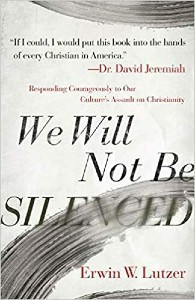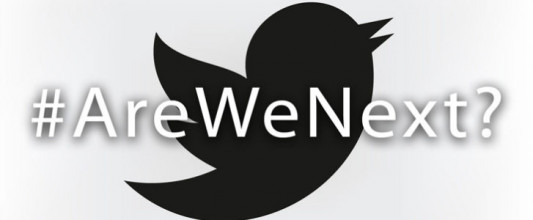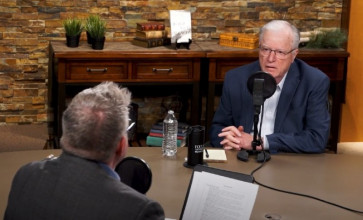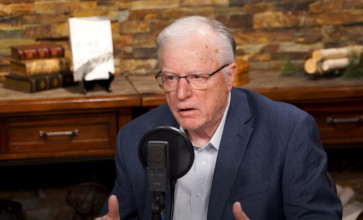Preview:
Dr. Erwin Lutzer: So let’s think through clearly what the Bible teaches. It says woe to those who call evil good. And what we must do is to stand against it and say we will not bow to the pressures of this culture.
End of Preview
John Fuller: That’s Dr. Erwin Lutzer, sharing about the very real lasting hope we have in Jesus Christ, no matter the difficulties we face in an increasingly hostile culture. And he’s our guest today on Focus on the Family as we dig into some tough issues that are colliding with our biblical worldview at a really breakneck speed. I hope you’ll stay with us for an important conversation. Uh, your host is Focus president and author Jim Daly. And I’m John Fuller.
Jim Daly: John, we are at a crossroads today in our culture. And it’s amazing how rapidly things are changing and not for the better. Some people call it woke culture, or cancel culture, where only certain points of view are allowed to be expressed. And many Christian viewpoints are generally unwelcomed in public settings. And unfortunately, we can expect more of that going forward. It’s a challenging time for us as moms and dads and for the church in general. So, how do we live courageously in a culture that wants to silence us? We were honored to have Dr. Erwin Lutzer in the studio a few days ago to help us address that question and help us respond in truth and love. This is going to be a very important conversation. And I hope you’ll learn from it just as I did and share this information with others.
John: Erwin Lutzer is Pastor Emeritus of The Moody Church in Chicago, where he served as senior pastor for 36 years. He’s written a number of books and his radio program Running to Win is heard on several 100 radio stations in the US and across the world. He’s written a great book called We Will Not Be Silenced. And that’s the basis for our conversation today. We do have copies of that book here at focusonthefamily.com/broadcast. And here’s how that conversation began. Dr. Lutzer, it’s great to have you back on Focus on the Family.
Dr. Lutzer: So wonderful to be with you today, Jim. And of course, we’re going to be talking about some very important topics.
Jim: Well, we are. And this one, of course, when you talk cultural issues. Boy, everybody’s gonna be kind of all over the map on things. But I love what you’ve done in your book, We Will Not Be Silenced, because it raises the absolutely right issues for right now. And this will be a unique Focus on the Family program as we talk about structures and biblically informed structures and non-biblically informed structures. And let’s get to it. Many Americans and Christians are deeply disturbed by what’s happening in our culture today. And it may feel like it’s happened overnight. But in your book, we’ve actually seen and you depict that these degrations of the Judeo-Christian value system have been chipped away at for decades. Explain that.
Dr. Lutzer: Well, it’s really true that there are a number of streams that have flowed into our culture. But I would say, Jim, that I think in the last years, we’ve seen a tremendous acceleration of these streams. But the one that I begin with and I want people to understand is cultural Marxism. Cultural Marxism differs from classical Marxism. Classical Marxism emphasize the fact of economics and the state was to become God in effect, and there was to be a revolution. Cultural Marxism says we can achieve the same ends incrementally.
Jim: Mm-hmm.
Dr. Lutzer: And what does that mean? First of all, it means the supremacy of the state. And once you have the supremacy of the state, you of course begin to take away human freedom, because humans don’t want to criticize the state that they’re dependent upon. But this is Focus on the Family. What we must understand is that Karl Marx believed that the family was a unit of oppression that had to be overthrown.
Jim: Hmm.
Dr. Lutzer: You see, his whole theory of history was based on oppression. Men oppressed their wives, parents oppressed their children, they took them to church, God was the ultimate oppressor, of course, and therefore the authority of God had to be overthrown. So, what was his answer? He said very explicitly, that it was to exploit the relationships within the family, but in effect, to destroy them to exploit children for his point of view, and therefore women should work outside the home because they should become a part of the means of production. And also the children should be educated by the state, so that the children could be properly informed regarding the evils of creationism and God and the Bible and church and so forth. So this was his vision. What we must understand is that oppression does exist, there’s no question about it. But Marx made a tremendously great error when he suggested that all bad behavior is because of oppression, just remove the oppression, and it will be all gone and people are gonna live together in harmony.
Jim: Right. And that really misses the nature of, of human beings, right? Our heart, the sin nature, because that’s not what we do typically. We, because of greed and other things, we tend to move toward those things that make us more comfortable, happier, et cetera. And, uh, that’s where he ultimately I think, misses the understanding of human nature.
Dr. Lutzer: What I do in my book, Jim, is I try to show people that back behind a lot of things, whether or not you’re talking about race, or you’re talking about government, cultural Marxism is in the background. And the reason that it’s important for people to understand that is to see the connectedness of events and what’s happening. I want people to understand that critical race theory, and the idea of defunding the police for example, are related, because it gets back to this idea of oppression. You know, the police are oppressive. If we take away the police, everybody’s gonna live in harmony, open the jails, because jails are oppressive. So, what you have in society is an application of Marxism. And many people might not realize it. And so there is an interrelation as we talk about it. I hope we get to freedom of speech and such things as propaganda that I discuss in the book.
Jim: Well, and broadly speaking, as we peel this onion, uh, we’re seeing a revolution in America. You know, I hadn’t thought of it that way. But it’s a slow grinding revolution that you mentioned in your book that seeks to rewrite history and discard the Judeo-Christian values that really did make the nation and it’s what the founders founded this nation upon. How would you describe that movement, in a wakeup call for the church to say that a revolution is underway, we just… We’ve kind of been asleep at the switch?
Dr. Lutzer: Well, I think after the death of George Floyd, many of the demonstrations were about racism. And Jim, you and I might disagree about this. But I think that they transitioned from issues of racism, to issues of revolution. And that of course, becomes very important, where you have the destruction of our monuments, but more seriously even, you have the destruction and the vilification of American history. And what you have been taught in our universities today is that America began with some evil man with evil motives. And so the issues of our supposed Judeo-Christian inheritance have to be destroyed. And of course, it’s destroyed because of racism. And all of us remember, and certainly, we emphasize the fact that slavery was horrible. It was so horrible that it ought to bring tears to everyone’s eyes. But there’s also some good things that should be said about America. And what we should do is to emphasize how far we have come in living up to our ideals. But it would be wrong for us to simply say, “Oh, we have to begin again.” And the whole idea of the radical left is to say that at the end of this revolution, on the other side, there’ll be an end to racism, an end to white supremacy, income inequality, and we’re gonna bring in that socialistic Marxist ideal.
Jim: Yeah. And, and the reality is, and I’ve seen it, I’ve traveled to 70 countries roughly. Uh, on behalf of focus, I was in Russia, when Gorbachev was taken in the coup, I was actually there setting up a trip for Dr. Dobson and others to come to the country and, and meet heads of state et cetera. And in that context, it’s a failed system. I mean, when you talk to the people, the idea that Marxism or communism can deliver what people need, it, it just does not. And everywhere around the globe, you see that Dr. Lutzer, whether that’s Venezuela or whatever. It, it just does not meet the needs of the people to, uh, bring the means of production and allow them, uh, products and goods that actually work. I remember being there and you know, you had to wait seven years for a car. And when you got the car, it barely ran. Uh, it’s a ridiculous system. In the… You know, I don’t know why in the United States when we look at this, why would be, we want to be the last one in the ring of nations that will potentially go through this embrace of communism or socialism or some form of it? I mean, what clownish activity? I mean, you have Europe already gone through it, and most of Eastern Europe has rejected it. Russia’s rejected it. To me, it’s just buffoonery that the United States in the 21st century, would say, “Oh, we need to try this.”
Dr. Lutzer: Socialism appears to be a winner. I mean, free college, free this, free that, it seems as if this is the way to go. The problem is, as Margaret Thatcher so accurately said, that the problem with socialism is pretty soon you’ll run out of other people’s money. What people need to realize in a socialist society and in a communist society, the money that you own, or the money that you earn is not your own. It doesn’t belong to you, it belongs to the state so that it can be dished out in accordance with equity and equality.
Jim: Right.
Dr. Lutzer: That’s why socialists always talk about how wealth can be distributed, they never talk about how it can be created, because socialism cannot create wealth, the only way socialism can survive is by a government that prints money to keep the ship afloat. So, we must recognize that it is doomed to fail. But my, it appears to be so good.
Jim: Yeah, the, the promises are big, but the delivery is thin.
Dr. Lutzer: It is an impossible delivery, actually.
Jim: Yeah. Um, how would you suggest that people view history in a more balanced way? I, I mean, what you’re saying and what the other side, if I could say it in those terms with those who embrace socialism, or communism, are suggesting is that the current system is really bad. There’s always gonna be bad in every system. We’re imperfect people. I, and I think even with the founders, when you look at it, of course, they were imperfect people, they were human beings, they got some things wrong. Slavery is at the top of the list. But the irony of that, when I had a, a person suggest to me when you look at it, slavery did not start in the United States. It was global. It went on for about 3000 years before the United States was ever created. But the genius of what they created in the Constitution, and I think they, they knew this, but they knew they could not achieve it at the time. That’s my supposition. But it only took 90 years to get to Abraham Lincoln from the, the writing of the Constitution. That’s impressive. They took a 3000 year, uh, horrific industry, and recognized it. Probably for political reasons, they could not solve it in their day, but they set the groundwork up through the constitutional-
Dr. Lutzer: Absolutely.
Jim: … rights to end it in 90 years. That’s impressive.
Dr. Lutzer: And to underline what you have just said, today, in the world, there are about 40 million slaves, primarily in Africa and in India. Now, one of the things that you will find like the 1619 project for example, they will never compare America to another country. Because if you ever compare America to another country, America is gonna come off looking pretty good. You can’t get people to hate America, if you compare America with other countries. But of course, there’s a lot of room for growth, there’s a lot of room for change. We aren’t where we should be, but we’re on our way. And to vilify the past, that somehow what you can do is now to build this brand, new future is foolishness. And as you pointed out, it’s been tried many times and it simply does not work.
John: Dr. Erwin Lutzer, sharing today some vital information on Focus on the Family and he’s captured his perspectives and research in his excellent book, We Will Not Be Silenced. Ask for a copy of that when you get in touch, just call 800-232-6459, 800 the letter A and the word FAMILY. And this is a two-day conversation on such an important topic. If you missed any part of it, get the download or request a CD so you can share it with others. All the details are at focusonthefamily.com/broadcast. And let’s continue now with more from Dr. Erwin Lutzer on Focus on the Family.
Jim: Uh, moving to the First Amendment, let me ask you about this. The First Amendment provides for freedom of speech and religion, uh, seems to be in jeopardy today, even though it’s right there. So, the very things that are plainly written as protected freedoms for us are now in jeopardy. What’s the strategy in the current revolution as they begin to chip away at those Judeo-Christian values to try and cancel or silence opposing views?
Dr. Lutzer: I find this very interesting because in 1977, my wife and I lived in Skokie, one of the suburbs of Chicago, and the Neo-Nazis came to the suburb to demonstrate. Now you must understand that this was an area, which, uh, there were many Jews living, people who had survived Hitler’s concentration camps.
Jim: Huh.
Dr. Lutzer: So there was a lot of, uh, interest, there was a lot of opposition. But in those days, Jim, those were different days, the ACLU said, no matter how offensive the speech is, freedom of speech means freedom of speech. Now, let’s find out what’s happening today. In the 60s, there was a Marxist by the name of Mark Cousy, Marcus, oftentimes is the way in which his name is simply pronounced. And he was committed to Marxism, but he says this, “As long as we have freedom of speech, the capitalists are going to take advantage of it. And as a result, they’re gonna win the debate. So there’s only one way that socialism, communism can thrive. And that is if we shut down freedom of speech.” And here again, this is why Marxism is so important for us to understand. What he was saying is that it is time for the oppressed to speak and the oppressors, namely, the capitalists should be quiet. So, what you have today in our universities is the idea that only those who are oppressed should have freedom to speak. If you’re a conservative, you’re an oppressor, and you should be silent, and you should simply listen. And by the way, if we hear something that offends us, we have to retreat into a safe place, so that we can lick the wounds of our unappreciated victimhood. So what you have and in the book, I quote, Stanley Fish, who says unapologetically, “A double standard has to be called for, it is time for the oppressors to be quiet, the oppressed must speak.” And that’s why there are so many limitations today regarding freedom of speech. And what’s interesting to me is this. When a conservative wants to speak at a university, and then it is discovered that he can’t because of riots and so forth, the University always comes up with a statement that says something like this, “We believe in freedom of speech, it is very important, but…” And then what follows is all the reasons why they really don’t believe in freedom of speech after all.
Jim: Yeah, something like the safety of the students is paramount. And therefore-
Dr. Lutzer: Yes.
Jim: … this is too-
Dr. Lutzer: Or there is harm that comes to the students.
Jim: (Laughs) Right. Well, in that regard, let me ask you about this. It’s something that has swirled around in my mind for quite some time, I remember visiting China and talking to Christians in China and hearing their heart about the one child policy, which thankfully, the Chinese government has begun to relax that policy, and that’s a step in the right direction. But there was this top-down understanding, the man is oppressing us, the government. And I think by and large, you know, the Chinese people generally, sought is that, that, you know, this is what government’s doing to oppress us that we can only have one child, et cetera. So it had that groundswell of discontent, if I could say it that way. The concern I have in, in the United States is that shaming that you’re talking about. The silencing of people that have a contrary opinion, that they have socialized that, and I think that’s far more dangerous, because it’s not coming from the man, it’s not coming top down, where we could agree that government is being heavy handed. It’s coming from neighbors, from other people in the community that you can’t speak out, because you’re saying things that offend them. Uh, it’s quite-
Dr. Lutzer: Yeah.
Jim: … different, I think.
Dr. Lutzer: And you know, these speech codes in the university, they are not intended to elevate the debate, they are actually intended to silence the debate. You don’t know what you can say or what you can’t say. I point out that many students in our universities, Christian students, they will not be talked out of their faith, but they will be mocked out of their faith. And because of the shaming that goes on that you refer to, as a result of that, oftentimes, you have this self-censoring attitude, where you just retreat into silence.
Jim: Which is a victory for the other side, really.
Dr. Lutzer: And you know, in my book, in every chapter, you might recognize this I always at the end, talk about the response of the church because that’s really where my heart is ultimately. What is the role of the church in the midst of a collapsing culture. And I pointed out how necessary it is for us to be able to speak in a culture in which the person who shouts the loudest wins the argument. We don’t shout, but we do have to speak. And what we have to do is to be willing to take the consequences. Here in America, we’re not used to that, we always think that we should be able to speak and everyone should be tolerant. But today, the issue is not tolerance, its dominance by the radical left.
Jim: But it’s wrapped in that label of tolerance.
Dr. Lutzer: Yes, of course. So, that’s the-
Jim: So, the ones that are asking for tolerance have become the most intolerant?
Dr. Lutzer: Well, we just talked about some writers, you know, who deny that we should have freedom of speech. But you know, they did use freedom of speech to write their books about it. (Laughs). And so what you-
Jim: That’s the irony.
Dr. Lutzer: …always have is this contradiction in these kinds of theories?
Jim: You know, uh, Dr. Lutzer, it’s so good, uh, to, you know, openly talk about this, I’m sure some people are gonna be offended by us. But let me continue with the questions. When you look at the radical left, they believe it’s, you know, that their actions, that their direction is actually protecting people from harm by labeling others as hateful, racist, or sexist, as you said. How could people be so blind, to not understand what it is they’re doing? It seems so obvious to us what’s going on now. It’s right out there on display in town square, but they don’t see it in themselves.
Dr. Lutzer: I think that you’ve put it very well. Churchill is quoted as saying the desire to believe something is much more compelling than rational arguments.
Jim: Huh.
Dr. Lutzer: So, what you have is today, a desire driven culture. I desire something and so I turn away from rationality, from argumentation, from discussion. And I go ahead with what I want to believe. And that’s of course, exactly what is happening, where there is a willful blindness to the fact that you are living with a contradiction that you are doing what you are denying that others should do, and people just don’t realize it.
Jim: Yeah. And you know, I want to get down to some practical examples. This has been hopefully interesting to people, but it’s impacting Christians on the ground. Uh, you know, just a few weeks ago, we had that incident, I think it was in Portland, where the Antifa group came to a prayer rally and damaged the, the equipment, threatened people, sprayed him with pepper spray, all those things were occurring. You have an example in the book about a church in Missouri called The Crossing. And there are many, many examples. But let’s talk about that one. What happened?
Dr. Lutzer: I’m very glad to talk about that one, because I have some first-hand knowledge about it. A pastor preached a message on transgenderism. He was very differential. He mentioned the fact that there is some of you who may be confused about your gender, and we welcome you to Christ, talk to us, we’re here to help you, to encourage you. But at the end of the day, Genesis 1:27, says that he created them male and female. All right. Just a standard message that 10 years ago-
Jim: (Laughs). Right.
Dr. Lutzer: … could have been preached in any evangelical-
Jim: Absolutely.
Dr. Lutzer: … church.
Jim: Yeah.
Dr. Lutzer: That night, they were on the news, they were vilified in the newspaper. This church had raised over $400,000 to pay off hospital bills for people who couldn’t afford it-
Jim: In the community.
Dr. Lutzer: In the community-
Jim: That’s incredible.
Dr. Lutzer: … they were very actively-
Jim: Yeah.
Dr. Lutzer: … involved. And now suddenly, people began to withdraw. There was a petition because the church was involved in some ministry, and they said that you can’t be involved anymore. And pretty soon there were 1000 signatures against the church and so forth. You know, Jim, I just wanna share my heart here. Throughout the years, I was always told, “Oh, the church needs to make sure that it is known for what it is for and not for what it is against.”
Jim: Mm-hmm.
Dr. Lutzer: Well, that’s wonderful. But the fact is that if you are against something like same sex marriage for example, if you’re against something, all the things that you are for fall by the wayside. Now, this issue becomes paramount, and you are vilified for what you believe. So, pastors need to walk a very fine line here. On the one hand, we have to be welcoming, but we cannot be affirming. But we always have to make sure that people who come to our churches are invited to Christ, they are invited to help. But at the same time, we have to draw the line and say, “Here I stand, I cannot do otherwise.” Let me give you an example. In Chicago, a public school teacher told me he was told it is not enough for you to simply tolerate same sex marriage, if you don’t celebrate it, you could lose your job. Now that’s a line in the sand. He can say, “You know, to some extent I can tolerate it, but I cannot celebrate what God has condemned.” So, let’s think through clearly what the Bible teaches. It says woe to those who call evil good. And that’s what’s happening in our culture.
Jim: Exactly.
Dr. Lutzer: And that’s only half the story.
Jim: Mm-hmm.
Dr. Lutzer: They are not finished until they take that which is good and call it evil, then the revolution is complete. And that’s where we are today in America where that which is good as being called evil.
Jim: Hmm.
Dr. Lutzer: And what we must do is to stand against it and say, we will not bow to the pressures of this culture.
Jim: Dr. Lutzer, I mean, this has my mind spinning. And you know, for the folks that are getting ready for work, driving down the highway listening on YouTube, um, it is an opportunity to really better understand what’s going on in the culture. And that was the main reason I really wanted to talk to you about your book. But we’ve got more ground to cover. And I wanna come back next time with more examples of where the cancel culture is paving a way to disaster in our opinion as believers. And then what does God expect of us in the church in this moment. Uh, the church has seen many things historically, Rome in the Roman Empire. And we can go on from there, but I’m looking forward to having you back. Can you do that?
Dr. Lutzer: I’d be glad to. And I’m so glad that we are going to be emphasizing the role of the church and helping Christians think through where they should draw the line and stand for Christ and take the consequences and consider it a badge of honor. Let’s do it.
John: Well, Dr. Lutzer’s great book is called We Will Not Be Silenced. Get a copy, read it, share the truth in there with others. And I do hope you can donate to help us as we broadcast the hope of Christ to the world when it is so desperately needed. For a gift of any amount today, we’ll send a copy of that book as our thank you for joining the support team here at Focus. Our number is 800, the letter A and the word FAMILY or online, we’re at focusonthefamily.com/broadcast. Also learn more about our online Christian new site called Daily Citizen, it informs you about important cultural developments affecting you and your family. And we’ve got details on the website. On behalf of Jim Daly and the entire team, thanks for joining us today for Focus on the Family. I’m John Fuller inviting you back as we continue the conversation with Dr. Lutzer, and once more help you and your family thrive in Christ.


























